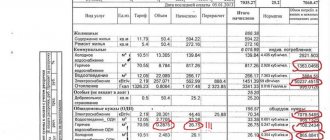Accumulated debts on utility bills can be forcibly collected from citizens. But there is a statute of limitations within which the injured party has the right to present its claims.
All owners of apartments in the building are required to pay a monthly fee for the resources actually used and the utilities provided by the management organization. Article 153 of the Housing Code stipulates that payment must be made on time and in full.
In a number of situations, citizens fail to fulfill their responsibilities and do not pay utility bills in good faith. As a result, resource supply organizations can disconnect the apartment from electricity and water, and collect debts through the courts. But here we take into account the period of time for which the debt can be returned to the plaintiff. This is the statute of limitations and for utility debt it is applied in accordance with the Civil Code.
Classification of housing disputes
- Division of real estate between co-owners and determination of the share of each;
- Illegal occupancy of citizens in residential areas;
- Violation of established rules for the use of residential premises, placement of production equipment in an apartment or private house;
- Conflicts with utility organizations regarding issues of unfair performance of work. This category includes disputes related to the lack of heating and hot water, illegal tariff increases, errors in the calculation of utility bills;
- Transfer of real estate from non-residential to residential or vice versa;
- Extension of the lease agreement;
- Moving in or moving out of citizens;
- Demolition of unsafe buildings and further resettlement of residents.
According to current legislation, housing disputes can be considered administratively or judicially. No legal act clearly states which categories of cases are within judicial jurisdiction. That is why, when choosing a method to protect the applicant’s rights, lawyers rely on their own experience and practice in dealing with such disputes.
Cases equivalent to the absence of a statute of limitations
Art. 196 of the Civil Code establishes a maximum period for protecting rights of 10 years. There is one exception to this rule. It concerns terrorist crimes.
The maximum period is not directly established and depends on the statute of limitations for prosecution provided by criminal law.
Today, this category of crimes does not have such a period, which equates these cases to those when the statute of limitations does not apply.
Author of the article
Administrative review
In recent years, at the stage of pre-trial settlement, it has been customary to resolve the following categories of cases:
- Use of living space other than for its intended purpose;
- Carrying out spontaneous redevelopment;
- Transfer from residential to non-residential without appropriate permits from local authorities;
- Recognition of the premises as unfit for habitation due to incomplete or poorly carried out repairs.
If your problem falls into one of the above categories, you must notify the housing inspection and proceed according to the following algorithm:
- Notify the local administration of a housing dispute;
- Receive written confirmation that your application has been accepted and recorded properly;
- Prepare a protocol, copies of the claim and other documents, check their compliance with current legal standards;
- Wait for the case to be reviewed by representatives of the inspectorate;
- Receive a written decision in your hands.
If the decision made does not resolve the conflict or seems to you to be illegal and unfair, you can go to court yourself.
Features of debt collection for utility bills
The specifics of debt collection for utility bills are determined by the area of offenses where the conflict between the parties arose, which led to such a trial.
Let's highlight the general features that, in principle, remain unchanged:
- The filing of an application can only be made by the plaintiff or the defendant. This is not possible for a third party. The defendant's claim that the statute of limitations has expired is essentially grounds for dismissal of the claim.
- The claim may contain both basic and additional demands. The first may include, for example, repayment of debt, and the second - payment of penalties, fines, interest, penalties, collateral, etc. Moreover, keep in mind that the expiration of the statute of limitations on the main claim automatically leads to the expiration of the period on auxiliary ones.
- If an application is received from the defendant that the collection period has been missed, then the first court hearing is the last. The court decision becomes a refusal to satisfy the claim. As a result, the defendant manages, in essence, to avoid punishment, save his own time, eliminate the need to pay costs, and get rid of any restrictions and imposed arrests. Otherwise, the judicial procedure will be carried out in full. By the way, filing an application for a missed statute of limitations is the legal right of the defendant.
- Changing the statute of limitations “by mutual agreement” between the parties to the dispute is impossible, since they are prescribed by law.
The judge pays attention to the limitation period only if there is a statement from the defendant. “By default” this will not be applied, as a result, the concept is not even considered
At the initiative of the court, the issue of delay or statute of limitations does not arise, which is important to remember
Disputes resolved in court
The following categories of cases are resolved in a court of general jurisdiction or in arbitration:
- Determination of ownership shares when dividing or inheriting a property;
- Illegal eviction from living space;
- Forced exchange of housing;
- Illegal or invalid privatization.
If the owner of the property is a legal entity or individual entrepreneur, you need to apply to the arbitration court. Some disputes involve mixed interests, so it is important to properly divide the claim. Another problem is the large number of interested parties. Because of this, time is wasted on conducting numerous examinations or involving all parties to the conflict. For example, if a dispute affects the interests of minor children, the claim is considered with the participation of representatives of the guardianship and trusteeship authorities. In some cases, prosecutors intervene in the process.
When considering a case in court, each party retains the right to provide evidence, make motions and call witnesses. If the decision made does not satisfy one of the parties, it can be appealed. All housing disputes are characterized by many nuances and high complexity. If you are not sure that you can protect your rights on your own, seek help from lawyers as early as possible. This will help you develop the right tactics in the legal process, prepare documents and collect evidence. The main mistake of many applicants is poor quality of paperwork. For this reason, judges often refuse to consider claims or dismiss them even if there are compelling arguments.
How to draw up a statement of claim to evict illegal residents from an apartment
You should also collect the necessary documents and contact the required judicial authority. Before submitting this document to the court, you must carefully study the basic rules for its preparation. In order for the court to begin considering the case and not return the claim to the applicant, it is necessary to act within the framework of the law. As for jurisdiction, district and city courts are responsible for considering cases of this nature.
From the definition it is clear that the right of use is a fairly broad concept and the list of reasons for its occurrence is long. Thus, various laws provide for the rights to use real estate, water bodies, subsoil, land, etc.
Russian President Vladimir Putin signed a federal law granting the right to conduct forensic examinations to the Investigative Committee of the Russian Federation.
To begin this procedure, you need to draw up a statement of claim for forced eviction. Only in this case will the process have legality and all norms will be observed.
Warnings from the defendant about the inadmissibility of unlawful behavior and the elimination of violations must be recorded in writing.
Dear readers! The article talks about typical ways to resolve legal issues, but each case is individual.
It must indicate all the demands that you present to the court. Also indicate exactly how you became the owner of the apartment, when former members of your family began to live in it, how they began to live there, whether an agreement was concluded, why you want the court to deprive them of the right to live.
Ekaterinburg, st. Novgorodtseva. I purchased this apartment on the basis of a purchase and sale agreement dated May 19, 2006. Today, my son and I are registered.
What follows is a descriptive part indicating the features of the pre-trial proceedings, the measures taken by the plaintiff, the main circumstances of the case and the list of documents drawn up. In the motivational part, it is necessary to provide an analysis of the relevant clauses of the civil contract or the legislation of the Russian Federation that were violated by the defendant.
It must be remembered that you should not block access to the premises and change the locks until the tenant has left the apartment.
Getting rid of people who have moved into someone else's apartment is not easy, but it is possible. This will require a court decision on eviction, and often the assistance of bailiffs in the forcible expulsion of illegal tenants.
So, according to Art. 3 of the Housing Code of the Russian Federation (hereinafter referred to as the Housing Code of the Russian Federation), no one can be evicted from an occupied residential premises other than on the grounds and in the manner prescribed by law.
Statute of limitations for housing disputes
When considering cases in court, it is important to submit an application in a timely manner and not miss the statute of limitations. For most conflict situations, this period is limited to three years. Disputes related to the donation of real estate can be considered within a year, cases of transactions under threat of violence, fraudulent actions in the housing sector - within five years.
Many people are interested in the question: is it possible, in the presence of strong evidence, to do without hearing the case in court? Don’t waste time, don’t pay state fees. The law allows for the resolution of housing disputes without trial. Most often, this happens when a close relative acts as a defendant, the plaintiff has no desire to go to court, and the conflict concerns the quality of the work performed. Mutual agreement of the parties to negotiate is a reason to resolve the conflict quickly and without litigation.
Additional requirements that are not subject to the statute of limitations
Since the list in Art. 208 of the Civil Code is not exhaustive; there are other similar situations. Claims for which the statute of limitations does not apply are supplemented by a number of types of claims. These include:
- copyright protection;
- rules provided for by the legislation on atomic energy that relate to harm and life to the health of citizens;
- claims arising from targeted debt obligations of the Russian Federation that arose during the Soviet period.
Examples from legal practice
Each case is considered by specialists individually, but we will try to analyze the most typical situations that occur in the practice of our company’s specialists.
The apartment was flooded by neighbors
A fairly common problem, the damage from which can amount to hundreds of thousands of rubles. A conflict is inevitable, but if the other party is ready to negotiate and pay off the damage caused, the issue can be resolved out of court. If you fail to reach an agreement peacefully, engage a competent lawyer who will help you assess the damage caused and correctly draw up a statement of claim in court. Remember that you can demand not only restoration of the apartment, but also compensation for moral damage.
Privatization and property transactions
During privatization, ownership of the property is formalized, and the category of premises is determined - residential, emergency, service, etc. If privatization has not been carried out, this will significantly complicate the sale transaction. To sell a property, the consent of all residents is required, and determining shared ownership is difficult for a person without legal experience and education.
A separate category of housing disputes is illegal construction or redevelopment. Practice shows that such conflicts are rarely resolved pre-trial.
Eviction by court
When purchasing a home, it is sometimes discovered that there are still registered tenants or previous owners in the apartment or house. This problem can be solved in court, because the mere presence of a document confirming your ownership is a compelling argument for the court.
Sometimes eviction is required if tenants violate the comfort and interests of neighbors, interfering with common living. Failure to comply with sanitary standards, noise, and violation of law and order are serious reasons for eviction through the courts.
Another reason to evict a person is that he has significant debt on utility bills. Usually in such situations, local authorities decide to move to a smaller apartment. The difference in price between properties goes to pay off the debt.
The complexity of housing disputes is that the correct solution is not always on the surface, and conclusions that are obvious at first glance are erroneous. Even an experienced lawyer does not make predictions before reading the documents and studying the situation. Timely consultation will help you avoid mistakes, correctly formulate requirements and resolve conflicts with minimal consequences.
15 years of experience in the legal services market
Legal Agency of St. Petersburg was founded in 2004 and has been successfully operating for 15 years
30 experienced specialists
Our team consists of competent lawyers and attorneys with narrow specialization in certain areas of law
10 years minimum legal experience
All consultations are conducted by lawyers with experience in successfully resolving similar situations, which ensures maximum assistance to the client.
91% of cases won
The results speak for themselves - since 2004, 3,756 cases have been won, 5,073 clients have been satisfied, and 874,474,045 have been paid to them
72% of appealed court decisions
We take on cases of any complexity and at any stage of the process, but the sooner you contact a specialist, the more likely a positive outcome of the case is
24 hours on call
We are ready to handle your case from start to finish, accompanying and supporting you throughout the entire process.
What is missing the statute of limitations?
According to the Code of Civil Procedure of the Russian Federation, the provided regulatory period acts as a means to protect the rights of the defendant. The moment of presenting claims for more than three years, for example, in 2021 to collect debts for 2011 - 2014, is determined by the court as a missed period for the submission of claims by utilities and most likely will not be considered. The limitation period is applied at the request of the defendant.
It is possible to write a statement and attach it to the case for the collection of utility debts after filing claims. In this case, the court explains to the plaintiff the legal consequences of the missed period, the possibility of restoring the declared period and determines the date for the hearing of the case on the application of the missed period. If the period is missed and there are no legal grounds for its renewal, then the court refuses to forcefully collect debts for utilities.
It is necessary to draw up a statement about the omission of an event in accordance with the requirements of the law in order to convey clear and correct data on the case during the proceedings.
Citizens who are debtors need to know that the rules for applying the calculation of the regulatory period also apply to collection companies, whose help utility services resort to in dealing with unreliable tenants.
Court decisions
On your own rake: what nuances should not be forgotten when it comes to the housing issue
Dispute with a housing construction cooperative
Apartment disputes: eviction of a family member
When dividing property, the court left the wife an apartment purchased during marriage
My housing: what to do if they try to kick you out of your apartment
How to sue a developer for a penalty
How to prove illegal residence
Since the grounds for living in an apartment (that is, ownership and ownership) are documents of title - a warrant for occupancy or a social tenancy agreement, privatization documents, a certificate of ownership, the absence or invalidity of such documents from persons living in the apartment will indicate that that they have no right to occupy housing.
Each owner has the right to demand the recovery of his property from someone else’s illegal possession (Article 304 of the Civil Code of the Russian Federation), as well as to protect it by all legal means.
If a person illegally living in an apartment does not agree to leave it voluntarily, he will have to go to court with a claim for eviction from the apartment.
To such an application, you must attach your documents on ownership, as well as evidence confirming, in the opinion of the plaintiff, the fact of illegal residence there of specific citizens (defendants).
Thus, the defendants will have to present documents with which they justify their residence in the apartment. The court will determine what circumstances are important in a particular case, which of the parties (plaintiff or defendant) needs to prove this.
Customer Reviews
Gratitude to Solovyov I would like to express my deepest gratitude and appreciation to Konstantin Vasilievich Solovyov for his attentive attitude and very competent consultation. And if I ever need legal support, I will definitely turn to him. I would also like to mention Daria Valentinovna Kutuzova, who greeted me with a smile and answered some of my questions. I wish the company success, further prosperity, and more clients.
Gratitude from Balitskaya A.S. I express my deep gratitude to Alexander Viktorovich Pavlyuchenko for his efficiency and professionalism in resolving controversial issues. The pre-trial settlement was completed as quickly as possible.
Balitskaya A.S., 05/15/2019
Customer Feedback We thank the employees of Legal Agency of St. Petersburg LLC and, first of all, Yana Maksimovna Matveeva and Andrey Valerievich Ermakov for their highly qualified and thorough consideration of our issue and the prompt solution to our housing problem.
Also to Daria Valentivna Kutuzov for her attentive and friendly attitude towards visitors.
Gratitude from A.P. Sovenova and E.Ya. Komudina Dear lawyers!
Please accept our deep gratitude for your attention, professional approach and desire to help people. We especially want to highlight Dmitry Germanovich, Denis Yuryevich, Daria Valentinovna.
Best regards, A.P. Sovenov, E.Ya. Komudina
Thanks to Stepanov D.Yu. I express my deep gratitude to lawyer Denis Yuryevich Stepanov for his high professionalism and attentiveness to his case when considering the issue in word with a contractor who improperly completed the work of erecting a screw foundation. The cost of the work amounted to 178,300 rubles. And the court of the Vyborg district (Case No. 2-1432/2018) dated March 12, 2018) to collect, taking into account all fines, 504,800 rubles. Once again, I thank you and wish you success in your future work and only successful business conduct.
Grateful to you, your client. 05/18/18
Thanks to Stepanov D.Yu. from Shcherbakova T.I. I would like to express my deep gratitude to Denis Yuryevich Stepanov for the very competent, highly qualified handling of my difficult case of terminating a contractual agreement with a problematic developer, who repeatedly postponed the completion of construction and completely ignored our claims (from other legal companies). The claim and complaints of Denis Yuryevich put everything in its place quickly enough, saving us from the threat of penalties from the developer, who unlawfully included them in the contract. Good luck to you in defending our legitimate interests! Thank you!
Sincerely, Shcherbakova T.I. 04.12.2017
Gratitude from Ustinova T.M. I would like to express my deep gratitude to Sergei Vyacheslavovich for the legal services provided when I had a difficult relationship with Beauty Salon LLC and Alfa-Bank.
Ustinova T.M. November 10, 2018
Gratitude from N.S. Khokhlov I am Khokhlov N.S. I express special gratitude to lawyer A.V. Pavlyuchenko who defended my consumer protection rights. I was pleasantly surprised by his professionalism, where he discovered the false address of my defendant registered in the Unified State Register of Legal Entities, and also defended me, as I believe, from the unreasonable decisions of the trial judge. If I need legal assistance in the future, I will only turn to A.V. Pavlyuchenko.
N.S. Khokhlov December 12, 2017
Gratitude from Truk N.N. I would like to express my gratitude to Vasily Anatolyevich Kavalyauskus, Alexander Viktorovich Pavlyuchenko and Maxim Andreevich Lobur for providing qualified legal assistance, with the help of which my problem was resolved quickly and clearly. When contacted, I always found understanding and attention. It’s good that the “Society for the Protection of Consumer Rights” employs such lawyers and advocates. I wish you success in your future work and defending the interests of consumers.
Sincerely, Truk N.N.
07.05.2018
Gratitude from Loseva S.I. I express my deep gratitude to Sergei Vyacheslavovich (lawyer of the firm) for his very clear, accessible help in solving my problem (protecting rights as a consumer). This is the second time I have contacted you to solve my problems. Always everything......and in full.
With gratitude, Svetlana Ivanovna Loseva, 02/15/2019
Best Lawyers in Moscow
First Capital Legal CenterPhone, (985) 776 13 39
The concept of “timing” is directly related to the objective factor of time. And it means subjective rules of calculation: beginning, end or period of time. Therefore, in principle, deadlines are a legal concept, i.e. This is the expiration of a certain period of time, the onset of certain dates. And they are considered as legal facts related to the emergence, change or termination of civil legal relations. The limitation period is recognized as a period for the forced protection of a violated right by filing a claim in court (Article 195 of the Civil Code of the Russian Federation). The purpose of the statute of limitations is to provide the victim with a strictly defined, but quite sufficient period to protect his rights. After the expiration of the limitation period, the victim is deprived of the possibility of forced (judicial) protection of his right, but the violated right itself remains. In this way, the limitation period differs from the preemptive period, the expiration of which entails the loss of the right. The limitation period is designed to help eliminate instability and uncertainty in the relations of participants in civil transactions. In its absence, the authorized person (victim) could hold the faulty debtor (violator) under threat for as long as desired
application of state coercive measures without realizing one’s interest in protecting the violated right. In addition, after a long period, collecting evidence becomes difficult (witnesses may forget essential circumstances, documents are lost, etc.). Thus, the establishment of a limitation period, encouraging a party to go to court to protect its right, simultaneously serves the interests of the other party and the interests of the legal order as a whole. The general limitation period, which applies to most claims of subjects of civil law, is set at three years (Article 196 of the Civil Code of the Russian Federation). In accordance with paragraphs 1 - 2 of Art. 199 of the Civil Code of the Russian Federation, a claim for the protection of a violated right is accepted for consideration by the court regardless of the expiration of the limitation period. The limitation period is applied by the court only upon the application of a party to the dispute made before the court makes a decision. The expiration of the limitation period, the application of which is declared by a party to the dispute, is the basis for the court to make a decision to reject the claim. Part 6 of Art. 152 of the Civil Procedure Code of the Russian Federation (hereinafter referred to as the Civil Procedure Code of the Russian Federation) provides that at a preliminary court hearing the defendant’s objection regarding the plaintiff’s omission without good reason of the statute of limitations for the protection of the right and the period established by federal law for going to court may be considered. If it is established that the statute of limitations or the deadline for going to court has been missed without good reason, the judge makes a decision to reject the claim without examining other factual circumstances in the case. The court's decision may be appealed. In accordance with Part 4 of Art. 198 of the Code of Civil Procedure of the Russian Federation, in the event of a refusal of a claim due to the recognition of unjustified reasons for missing the statute of limitations or the deadline for filing a lawsuit, the reasoning part of the court decision indicates only the establishment by the court of these circumstances. The main issues of judicial application of the legislation on limitation of actions are explained in the Resolution of the Plenum of the Supreme Court of the Russian Federation and the Plenum of the Supreme Arbitration Court of the Russian Federation dated November 12, 15, 2001 N 15/18 “On some issues related to the application of the norms of the Civil Code of the Russian Federation on claims prescription" (hereinafter referred to as Resolution No. 15/18). Thus, in accordance with Resolution No. 15/18, when preparing a case for trial, the judge does not have the right to invite any of the parties to present evidence or give explanations (including in the judge’s ruling on preparing the case for trial) related to missing the deadline for filing a claim. prescription If an interested party (for example, a defendant in a response to a statement of claim) refers to the passage of the statute of limitations, the judge has the right, in order to prepare the case for trial in order to ensure its timely and correct resolution, invite each of the parties to present relevant evidence on this issue (p. 3 of Resolution No. 15/18). Taking into account the fact that the law does not provide for any requirements for the form of an application from a party to a dispute regarding the passage of the statute of limitations, it can be made both in writing and orally directly during the trial. In the latter case, the statement made is indicated in the minutes of the court hearing (clause 5 of Resolution No. 15/18). If during the trial it is established that a party to the case has missed the statute of limitations and there are no valid reasons (if the plaintiff is an individual) to restore this period, then if there is an application from the appropriate person about the expiration of the statute of limitations, the court has the right to refuse to satisfy the claim precisely for these reasons, since in accordance with paragraph. 2 p. 2 art. 199 of the Civil Code of the Russian Federation, the expiration of the limitation period is an independent basis for refusing a claim (clause 26 of Resolution No. 15/18). 3. Application by courts of limitation periods in cases of eviction of citizens from occupied residential premises The modern institution of limitation periods in the current civil legislation arose in the mid-90s. XX century after the entry into force of part one of the Civil Code of the Russian Federation. The entry into force in March 2005 of the Housing Code of the Russian Federation, the change in the legal status of residential premises of a specialized housing stock led to numerous appeals from representatives of state and municipal authorities, unitary enterprises and institutions with claims against citizens who lost the right to use official housing due to the termination of official and labor relations with the plaintiffs. Many citizens are faced with the threat of eviction from official housing and dormitories without the provision of other living quarters. In judicial practice, a certain system has been formed to protect the rights of citizens to live in official residential premises and residential premises in dormitories. The legal literature notes that there is no common understanding of the nature of an eviction claim, and with it the possibility of applying statutes of limitations. For example, in one of the cases, the court of general jurisdiction (Karasuk District Court of the Novosibirsk Region) came to the conclusion that the administration of the city of Karasuk, demanding the eviction of Zh. from the occupied residential premises, filed a vindication claim, which is subject to a limitation period of three years. On the contrary, by the decision of a court of general jurisdiction, referred to by the Constitutional Court of the Russian Federation in its Decision of February 24, 2005 No. 51-O “On the refusal to accept for consideration the complaint of citizens Alexander Nikolaevich Manakhov and Galina Apollonovna Manakhova for violation of their constitutional rights by the provisions of the articles 208, 304 and 305 of the Civil Code of the Russian Federation,” citizens A.N. Manakhov, G.A. Manakhova, Yu.A. Manakhova and minor A. Manakhov were evicted from an apartment in a state housing building, which was previously a departmental apartment-type dormitory, as having occupied it outside the established procedure for providing living space, with the right to move into another apartment in the same building. At the same time, the court found the plaintiffs’ argument about missing the statute of limitations invalid, concluding that, by virtue of Art. 208 of the Civil Code of the Russian Federation, the limitation period does not apply to demands for eviction; The current housing legislation does not provide for the acquisition by citizens of the right to residential premises in state or public housing stock only due to long-term residence in residential premises; the entry of citizens into residential premises must be carried out in accordance with the requirements of current legislation. The cassation court, leaving this decision unchanged, indicated that the statement about the expiration of the statute of limitations for filing a claim for eviction could not be taken into account by the court, since in the absence of legal grounds for occupying the disputed apartment, the owner of the residential premises had the right at any time to put the question of his release and this requirement is not subject to limitation of actions as a requirement of the owner or other possessor to eliminate violations of their rights not related to deprivation of possession. The practice of application by the Supreme Court of the Russian Federation of the Housing Code of the Russian Federation is quite successfully disclosed in the Resolution of the Plenum of the Supreme Court of the Russian Federation dated July 2, 2009 No. 14 “On some issues that arose in judicial practice when applying the Housing Code of the Russian Federation.” Issues related to the application of the limitation period are also reflected in the said Resolution. In particular, in paragraph 9 of the Resolution of the Plenum of the Supreme Court of the Russian Federation dated July 2, 2009 No. 14, it is explained that if the RF Housing Code does not establish a limitation period for the protection of violated housing rights, then the limitation periods provided for in disputed housing relations are applied Civil Code of the Russian Federation (Articles 196, 197), and other provisions of Chapter. 12 of the Civil Code of the Russian Federation on the limitation period (Part 1, Article 7 of the RF LC). At the same time, to controversial housing relations, one of the grounds for the emergence of which is an agreement (for example, a social tenancy agreement for residential premises, an agreement for the rental of specialized residential premises, a sublease agreement for residential premises, an agreement for the occupancy and use of residential premises for a family member of the owner of the residential premises, etc.) , a general three-year limitation period applies (Article 196 of the Civil Code of the Russian Federation). Paragraph 28 of the said Resolution of the Plenum of the Supreme Court of the Russian Federation provides that if the written consent of the tenant and (or) family members of the tenant, as well as the consent of the landlord, when necessary (Part 1 of Article 70 of the Housing Code of the Russian Federation) has not been obtained for moving a person into a residential premises ), then such move-in should be considered illegal and does not give rise to the person’s rights as a member of the tenant’s family to the residential premises. In this case, the landlord, tenant and (or) a member of the tenant’s family have the right to present to the person who moved in a demand to eliminate violations of their housing rights and restore the situation that existed before their violation (Clause 2, Part 3, Article 11 of the Housing Code of the Russian Federation), which is based on from the analogy of the law (Part 1 of Article 7 of the Housing Code of the Russian Federation) in relation to the rules provided for in Art. 208 of the Civil Code of the Russian Federation, the limitation period does not apply. If this requirement is satisfied, the person who illegally moved into the residential premises is subject to eviction without the provision of another residential premises. A.V. does not entirely agree with this conclusion. Zarubin <6>, who considers the position that an eviction claim is a type of negatory claim that entails legal consequences under Art. 208 of the Civil Code of the Russian Federation (the statute of limitations does not apply to eviction claims) In a sense, one can agree with the indicated author, but only under certain circumstances. Let us give some examples from the practice of courts of general jurisdiction. Example 1. From the Determination of the Judicial Collegium for Civil Cases of the Moscow City Court dated March 16, 2012 in civil case No. 33-5680, it follows that the plaintiff filed a lawsuit against the defendants for eviction from the apartment without the provision of other living quarters. In support of the stated requirements, the plaintiff indicated that the above apartment was allocated to the defendants in 1991 temporarily until August 1, 1993. There are no documents on the basis of which the occupancy was made. The defendants have no grounds for occupying the disputed apartment. The status of a residential building should be determined as of this period as an apartment-type dormitory, i.e. intended, according to Art. 15 of the Law of the Russian Federation “On the status of military personnel”, for temporary residence during the period of service and training. The court found that in 1990 a financial personal account was temporarily opened for the defendants; the grounds for opening the account were not indicated; the documents on the basis of which the defendants moved into the apartment in 1990 were not presented to the court. It was also established that the defendants are not citizens of the Russian Federation. Discussing the petition filed by the representative of the defendants to apply the statute of limitations to the plaintiff’s claims, the court did not consider it to be satisfied. The defendants believed that the statute of limitations for the stated claims began to run from the date of expiration of the period for providing the defendant with the disputed premises - August 1, 1993. The trial court did not agree with this argument. In this case, the court referred to the provisions of Art. Art. 208, 301, 304, 305 of the Civil Code of the Russian Federation, indicating that in this case a claim was made by another owner of the residential premises (with the right of operational management) to eliminate violations of his (the plaintiff’s) right to the disputed residential premises, and therefore there is no statute of limitations for these claims distributed by. From the case materials it follows that the defendants did not submit documents to the court that could serve as a basis for moving into and living in this area after August 1, 1993. Example 2. In another case (Determination of the Judicial Collegium for Civil Cases of the Moscow City Court dated April 14, 2011 N 33-10771), the Department of Housing Policy and Housing Fund of Moscow filed a lawsuit against the defendants for reclaiming living space from someone else’s illegal property. possession and eviction, motivating their demands by the fact that the disputed residential area is a communal two-room apartment located at the address: ... owned by the city of Moscow. This residential premises is occupied by the defendants without legal grounds. Based on the above, the plaintiff asked the court to reclaim the residential premises located at the specified address from the defendants from illegal possession and to evict the defendants from this residential premises. The claims were satisfied in full. The courts found that the defendants have been occupying the disputed apartment since 2003. From the defendants’ explanations it follows that this apartment was provided to them by the deputy head of the Presnensky district administration of Moscow for the subsequent conclusion of a social rental agreement. At the same time, the decision to provide the disputed apartment to the defendants was not made by the executive authority in the prescribed manner, a warrant for the right to occupy the disputed residential premises was not issued to the defendants, and a rental (social tenancy) agreement was not concluded with the defendants for this residential space. Evidence to the contrary in accordance with Art. The defendants did not present Article 56 of the Code of Civil Procedure of the Russian Federation to the court. Therefore, the court came to a reasonable conclusion that the defendants did not acquire the right to use the disputed residential premises and were occupying this premises illegally. The court found that the decision to provide the defendants with the disputed residential premises by the executive authority in the prescribed manner was not made, a warrant for the right to occupy this premises was not issued, and a rental agreement (social tenancy) was not concluded. In accordance with Art. 208 of the Civil Code of the Russian Federation, the limitation period does not apply to the demands of the owner or other possessor to eliminate any violations of his rights, even if these violations were not associated with deprivation of possession (Article 304 of the Civil Code of the Russian Federation). Example 3. In another case (Decision of the Perm Regional Court dated December 28, 2011 in case No. 33-13326), the administration of a closed administrative-territorial entity filed a lawsuit against the defendants to evict them together with minor children from residential premises - an apartment without provision of other residential premises and deregistration. The requirement was motivated by the fact that the said apartment is municipal property and in 2001 was included in the number of service residential premises. The apartment was provided to the defendant as a military serviceman performing military service under a contract. In 2002, the defendant was prematurely transferred to the reserve due to organizational and staffing measures. Under the “Providing Housing for Young Families” program in 2009, the defendants were provided with residential premises, but they refuse to vacate the office premises. The court of first instance satisfied the claim. In the cassation appeal, the defendants asked to overturn the court's decision. The legal relations that have arisen regarding the use of official residential premises are of a contractual nature, and therefore the provisions of Art. 196 of the Civil Code of the Russian Federation on the three-year limitation period. The statute of limitations expired on April 30, 2005, and the application to the court was received on October 7, 2011. If the plaintiff was not aware of the defendant’s dismissal, then he became aware of the violation of his right on July 18, 2008, when the defendant was asked to vacate the residential property room. Provisions of Art. 208 of the Civil Code of the Russian Federation, to which the court referred, in this case, based on the nature of the legal relationship, were not subject to application. Their purchase of a three-room apartment under the “Providing Housing for Young Families” program cannot be grounds for eviction of the defendants, since the provisions of Art. Art. 101, 102, 83 of the Housing Code of the Russian Federation do not contain such a basis for terminating a rental agreement for specialized residential premises as the acquisition of ownership of another residential premises by tenants. However, the court of second instance came to the conclusion that in this case, the date from which the limitation period should be calculated is the fact that the defendant acquired residential premises, after which he ceased to be in need of improving living conditions, i.e. It was from the moment when the defendant lost the right to benefits that the ZATO administration had the right to file a lawsuit to evict him without providing him with another living space. As already stated above, the defendants acquired ownership of the apartment in November 2009, and the ZATO administration filed a claim in October 2011, i.e. within the three-year limitation period. Example 4. In another case, the district court, having established that the plaintiff was not in an employment relationship with a third party, rightfully considered that since the disputed residential premises in the building of the departmental housing stock were not provided in the manner prescribed by law, then there were grounds for satisfying the requirements for recognition of the right there is no use of residential premises on the basis of a social tenancy agreement and the obligation to make a decision on the provision of another comfortable premises in connection with the resettlement of the house at the disputed address. At the same time, taking into account the foregoing, the court of first instance rightly satisfied the oncoming demand of the administration to recognize the plaintiff by not acquiring the right to use disputed residential premises. At the same time, the district court reasonably rejected the arguments of a third party and plaintiff about the passage of the limitation period by the administration, since by virtue of the provisions of Art. 208 of the Civil Code of the Russian Federation, the statute of limitations does not apply to the requirements of the owner or other owner to eliminate all violations of his rights, at least these violations were not connected with the deprivation of ownership (cassation determination of the St. Petersburg City Court of October 11, 2011 N 33-15329/2011/2011 ). Example 5. From the determination of the judicial board for civil cases of the Moscow City Court of July 18, 2011 N 33-22233 it follows that the defendant graduated from the university in ... a year and was obliged to free this residential area with members of his family after ... a year. According to the extract from the order of the Minister of Defense of the Russian Federation on personnel N ... the defendant was dismissed from military service ... in connection with the failure to fulfill the military personnel of the contract. The court came to the correct conclusion that the plaintiff was missed by the established Art. 196 Code of Civil Procedure of the Russian Federation, a three -year term for a claim for eviction, since the course of this period began with the end of the defendant’s study at the university, i.e. From ... the year ended in ... year. There were no grounds for interrupting the course of the limitation period by the court. Under such circumstances, the court correctly and reasonably came to the conclusion that the passage of the limitation period is the basis for a refusal to refuse to evict the defendants Example 6. From the determination of the judicial board for civil cases of the Moscow City Court of January 20, 2012 in case No. 33 -1326 It follows that the statute of limitations are subject to statute of limitations that arose between the parties in the case of the legal relationship due to eviction on the grounds for termination of labor relations. 208 of the Civil Code of the Russian Federation cannot be applied to the requirements for the protection of the violated right of the owner (Article 304 of the Civil Code of the Russian Federation) in connection with the termination of the contract of hiring of a specialized living space. From the evidence presented in the resolution of the dispute, it follows that the defendant in the prescribed manner moved to the hostel for the beds provided to him, and paid for housing and utilities. Since in accordance with Art. Art. 50, 51 LCDs of the RSFSR, which at the time of the actual allocation of the defendant in the hostel, was not required to draw up a contract for hiring a dormitory in a written form, then its conclusion was carried out by opening a financial personal account in the name of the employer. The legitimate allocation of the employer in the disputed housing should be interpreted as the basis for the emergence of contractual housing relations, to the disputes to which the general three -year limitation period is applicable (Article 196 of the Civil Code of the Russian Federation, paragraph 9 of the Resolution of the Plenum of the Supreme Court of the Russian Federation of July 2, 2009 N 14 “On some issues that arose in judicial practice when applying the Housing Code of the Russian Federation”) Thus, since the plaintiff applied 16 years after the dismissal of the defendant to terminate the contract of employment with the enterprise, it is The legitimate conclusion of the court of first instance on the passage of the limitation period. Order for a dwelling in accordance with Art. 47 LCD of the RSFSR is the basis for the earnings in the living room, but the lack of a citizen of the warrant on the occupation of a residential
area when actually moving into the provided premises, living in it, performing the duties of a tenant does not in itself serve as an obstacle to such a person having the right to use the residential premises. The defendant did not commit unlawful actions when providing him with housing; a possible violation by officials of the established procedure for processing documents during the provision of living quarters in a hostel is not grounds for derogating from a citizen’s rights. 4. Conclusion Based on the foregoing, we can conclude that the use of the statute of limitations by the courts in cases of eviction of citizens from occupied residential premises depends on the legal basis (warrant, agreement, etc.) for moving these persons into residential premises. In the absence of such grounds, the courts apply the rules of Art. 208 of the Civil Code of the Russian Federation, according to which the limitation period does not apply to the demands of the owner or other possessor to eliminate any violations of his rights, even if these violations were not associated with deprivation of possession (Article 304 of the Civil Code of the Russian Federation). However, if the evicted citizens had legal grounds for moving into the residential premises and living in it, then the general statute of limitations applies to these legal relations (accordingly, the general provisions on the statute of limitations, including the beginning of this period). In this case, the limitation period begins from the moment when the relevant grounds (termination of the tenancy agreement, dismissal from military service, etc.) for living in the residential premises cease to exist.
For all questions related to legal advice on eviction, eviction from dilapidated houses, from houses subject to demolition, eviction from hostels, eviction from official (specialized) housing, eviction of an alcoholic, eviction of a defaulter, eviction from an apartment, eviction from a residential premises, eviction of a former family member, eviction of minors, eviction of a spouse, deregistration, you can make an appointment with the specialists of our
Center by calling
:
8 (985) 763 — 90 – 66;
8 (495) 776-13-39,
8 (985) 776 13 39 or by e-mail:
[email protected]
An appointment with a lawyer can be made by calling the above telephone numbers. Attention! Consultation is free of charge.
claim for eviction, Lease agreement, Move-in, Order, Right of use, Right of ownership, Termination of lease agreement, official housing, Family member, Claim for move-in, Statement of claim for eviction, Period of use
12/30/2014, 5761 views.
Arbitrage practice
In the practice of judicial proceedings, there is an example when the Criminal Code filed a claim against a citizen whose debt for utility services amounted to 57,987 rubles. Non-payment of bills occurred for 3 years and 6 months. At the same time, the amount of penalties is 11,345 rubles. The defendant filed a counter-petition to apply the limitation period. Due to the fact that missing the deadline was the fault of the management company, the court ruled to recover funds from the debtor for a three-year period.
Experts recommend that persons in difficult financial situations seek the possibility of pre-trial settlement. For example, if you lose your job, you can contact the management company with an application for payment in installments.
Debt write-off procedure
The write-off of arrears on utility bills is carried out on the basis of an application sent to the court. The petition is formed subject to a number of conditions.
In this case, the defendant has the right:
- To repay contributions for a specific month - the payer's full name does not matter. That is, both the owner of the apartment and his relatives can pay the bills.
- Endorsement of the reconciliation report with the utility company. However, signing the documents entails automatic recognition of the debt.
- Officially confirm the existence of a penalty and transfer money.
In case of arrears and legal proceedings, experts recommend not to renew payments. After the court publishes the order, you can write off non-payment and pay off only bills incurred during the last three years.
It is noteworthy that a citizen can take advantage of debt restructuring, i.e., according to PP No. 354, the consumer has the right to submit a request to a service company or RSO for an installment plan to pay receipts.
When contacting the company, the parties enter into an agreement to divide the amount into equal parts. Additionally, a period is prescribed that cannot exceed 3 years. In addition, the debtor needs to provide evidence, i.e., argue, the reason for the inability to pay bills.
Applications of this kind are considered by the Criminal Code and the RSO on an individual basis. In most situations, the management of an organization will accommodate a person in a difficult financial situation. For example, loss of a job, receiving a disability group, serious illness or dismissal due to bankruptcy of the enterprise.
Sample and rules for drawing up an application for the application of the statute of limitations for housing and communal services
To apply the statute of limitations for housing and communal services, you need to send a corresponding application to the judicial authorities. The document is formed in a free style and does not require specific knowledge from the citizen. The recipient of the petition is the district authority at the address of the real estate. If the amount of debt is less than 50,000 rubles, then the claim is sent to a magistrate.
Compilation rules:
- Full name must be entered;
- the consumer's residential address is indicated;
- By ;
- the text begins with the phrase “I ask, in accordance with Article No. 199 of the Civil Code of Russia, when considering the case on the claim of the Criminal Code “name” against me for the collection of debt for housing and communal services, to apply before the “date”, since the period has expired due to the fault of the plaintiff”;
- further, provide a list of documentation;
- sign and put the date, month, year.
The petition must be filed during the proceedings, i.e. before the decision is made. Otherwise, the court will decide to refuse to accept the paper, and the defendant will have to pay the entire amount of the unpaid receipts.
In addition, the management company or RSO has the right to collect compensation in the form of penalties, penalties, costs and penalties. It is problematic to challenge such a ruling.
Documents for the claim
In order to pay off a debt within the limitation period, in addition to the application, you should attach a package of papers to the claim:
- a receipt confirming the transfer of funds for the state fee;
- rent checks for a three-year period - absence of at least 1 invoice is not allowed;
- independently calculate the debt and attach an estimate if the figures do not coincide with the statement from the accounting department of the management company or RSO;
- papers confirming the need to direct finances to another area of life - for example, the owner’s illness, caring for a disabled person, loss of a job, etc.
All documents that can directly or indirectly help the debtor should be attached to the claim. When considering a case, the court takes into account all factors and circumstances.
Write-off of utility debts over 3 years without initiating legal proceedings
How not to pay for housing and communal services.
The regulatory legal acts of the Russian Federation stipulate one feature in which the application of a statute of limitations period for utility payments is not allowed - if the case is being considered by the court. For example, the Criminal Code filed a claim in 2015, and proceedings continue in 2021. Therefore, the defendant does not have the right to send such a petition, since there are no legal grounds.
Please note: if the owner of the property does not have other property whose sale can cover the debt, then the consideration of the case is suspended.
However, after a while it will be resumed when the defendant’s side has or the bailiffs find funds to pay off the arrears. It is noteworthy that unpaid receipts for services provided and maintenance is a problem for suppliers. The complexity is due to the fact that profits are distributed among expense items. Accordingly, in the absence or reduction of flow, the efficiency of work on the maintenance of MKD decreases.
The legislation of the Russian Federation does not always determine the possibility of collecting funds from the debtor.
For example, money is not written off if the following factors are present:
- expiration of the limitation period;
- death of the apartment owner as an individual;
- declaring RSO or management company bankrupt;
- other circumstances.
It is impossible to write off arrears in utility bills for over 3 years without judicial intervention. To carry out the procedure correctly and avoid overpayment, you need to submit a petition. If the defendant encounters difficulties during the litigation, experts recommend hiring a lawyer.










